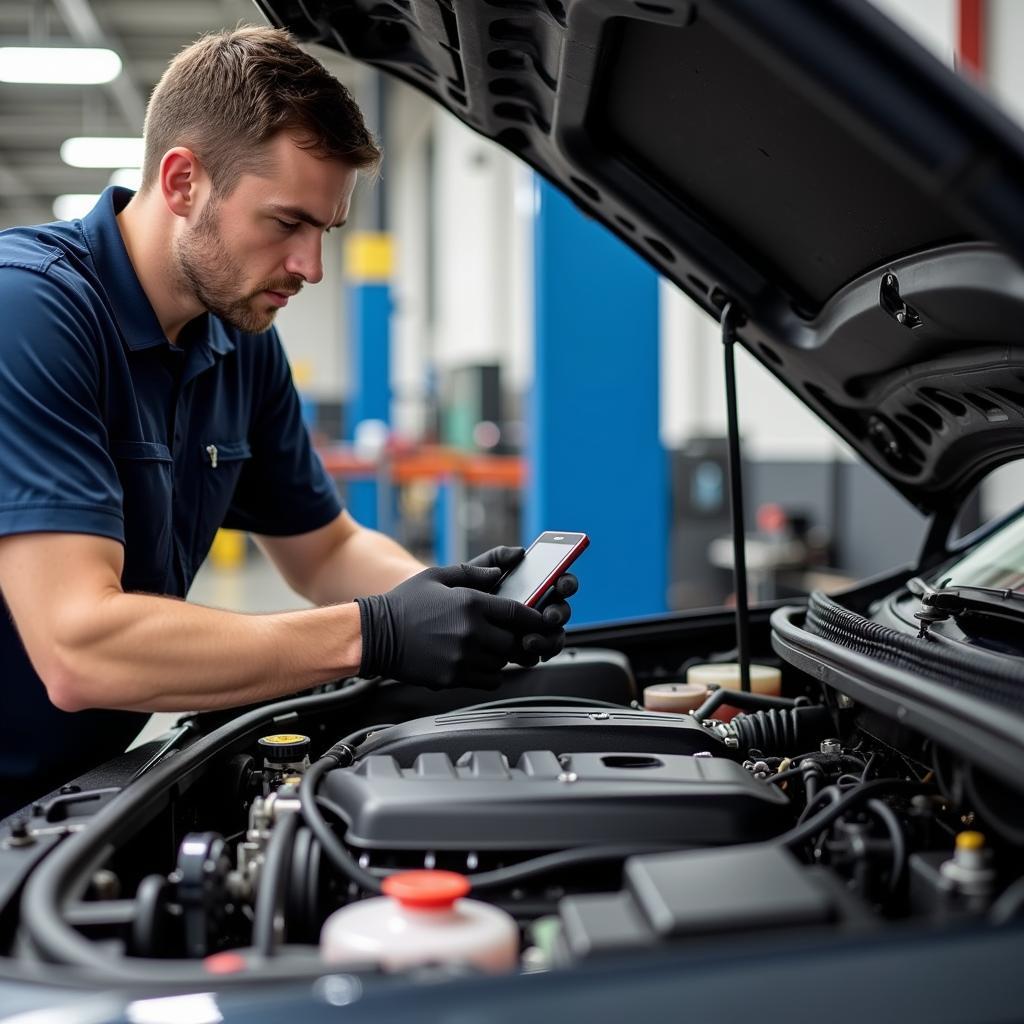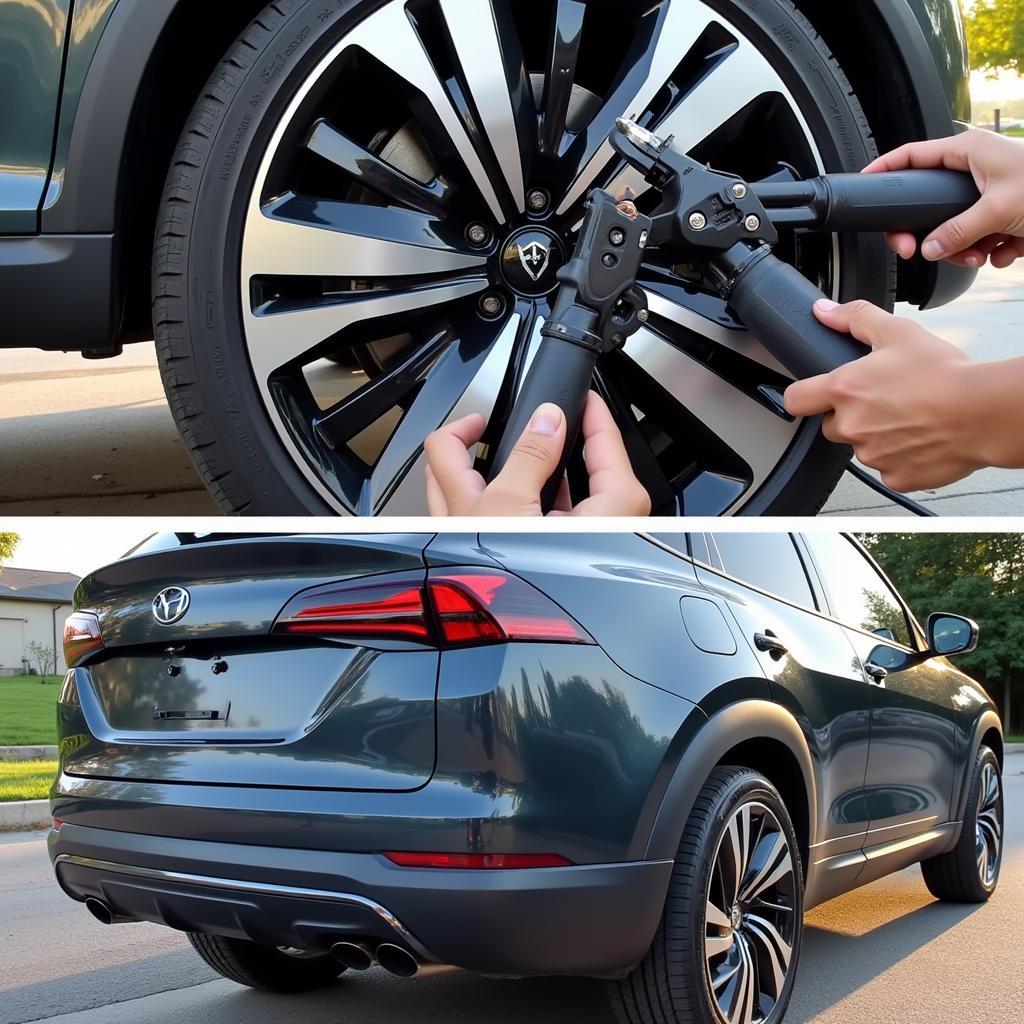What Happens When Your Car is Serviced?
A car service is much more than just an oil change. Understanding What Happens When Your Car Is Serviced is crucial for maintaining its performance, safety, and longevity. It’s an investment that pays off in the long run.
Whether you’re taking your car for a routine check-up or addressing a specific issue, knowing what to expect during a service appointment can empower you to make informed decisions and ensure you’re getting the best care for your vehicle. We’ll cover everything from basic checks to more complex procedures, providing a comprehensive guide to what happens behind the scenes at the garage. So, let’s dive in and demystify the car servicing process.
What Does a Car Service Entail?
A car service involves a series of checks and procedures carried out by qualified technicians to ensure your vehicle is running safely and efficiently. The specific tasks performed during a service depend on the type of service – interim, full, or major – and the age and mileage of your car.
Basic Checks Performed During Every Service
Regardless of the service type, certain checks are standard practice. These include:
- Fluid level checks: Engine oil, coolant, brake fluid, power steering fluid, and washer fluid are all inspected and topped off if necessary.
- Tire inspection: Technicians check tire pressure, tread depth, and overall condition, looking for signs of wear and tear.
- Brake inspection: Brake pads, discs, and lines are inspected for wear and damage.
- Light check: All exterior lights, including headlights, taillights, brake lights, and indicators, are checked to ensure they are functioning correctly.
- Visual inspection: A thorough visual inspection of the vehicle’s underside and engine bay is carried out to identify any potential issues.
Beyond these basic checks, the extent of the service depends on the type you’ve opted for.
Interim Service: Keeping Your Car Running Smoothly
An interim service is typically recommended every 6 months or 6,000 miles, whichever comes first. It’s a preventative measure designed to catch potential problems early and keep your car running smoothly between full services. In addition to the basic checks, an interim service often includes:
- Oil and oil filter change: Fresh oil is vital for engine health, and the filter prevents contaminants from circulating.
- Air filter check: A clean air filter ensures optimal engine performance and fuel efficiency.
For information on how often to service your diesel car, check out how often service diesel car.
Full Service: Comprehensive Care for Your Vehicle
A full service is more comprehensive than an interim service and is usually recommended annually or every 12,000 miles. It covers everything included in an interim service, plus a wider range of checks and replacements. Some additional tasks in a full service might include:
- Spark plug replacement: Worn spark plugs can affect fuel economy and engine performance.
- Cabin air filter replacement: A fresh cabin air filter improves air quality inside the car.
- More in-depth inspections: A full service often includes a closer inspection of suspension components, steering, and exhaust system.
Major Service: Ensuring Long-Term Reliability
A major service is the most comprehensive type of service and is typically recommended every 24,000 miles or 2 years. It includes everything in a full service, as well as more extensive checks and replacements. Key aspects of a major service include:
- Timing belt replacement (if applicable): A crucial maintenance task to prevent catastrophic engine damage.
- Coolant system flush: This removes contaminants from the cooling system and helps prevent overheating.
- Transmission fluid change (automatic transmissions): Ensures smooth gear changes and prolongs transmission life.
If you’re wondering what happens when your car gets serviced, or perhaps more specifically, what happens to your car when it’s service, knowing the differences between these service types is crucial.
 Mechanic conducting a major car service engine check
Mechanic conducting a major car service engine check
What Happens If You Don’t Get Your Car Serviced?
Neglecting regular servicing can lead to a range of problems, from reduced fuel efficiency and performance issues to more serious and costly repairs down the line. You can find more details about the consequences of skipping car services in this article: what happens if you dont get your car serviced. Alternatively, you can also learn more about what happens when your car gets serviced in our comprehensive guide.
Conclusion
Understanding what happens when your car is serviced is essential for responsible car ownership. Regular servicing not only keeps your vehicle running smoothly and safely but also helps to prevent costly repairs in the future. By knowing what to expect during a service appointment, you can make informed decisions and ensure your car receives the best possible care.
FAQ
- How often should I service my car?
- What is the difference between an interim and a full service?
- How much does a car service cost?
- What should I do if my car breaks down between services?
- Can I service my car myself?
- How do I choose a reputable car service center?
- What is included in a major service?
For more information on what happens when your car gets serviced, please refer to what happens when your car get serviced.
Need assistance? Contact us via WhatsApp: +1(641)206-8880, Email: [email protected] or visit us at 456 Oak Avenue, Miami, FL 33101, USA. Our customer service team is available 24/7.

